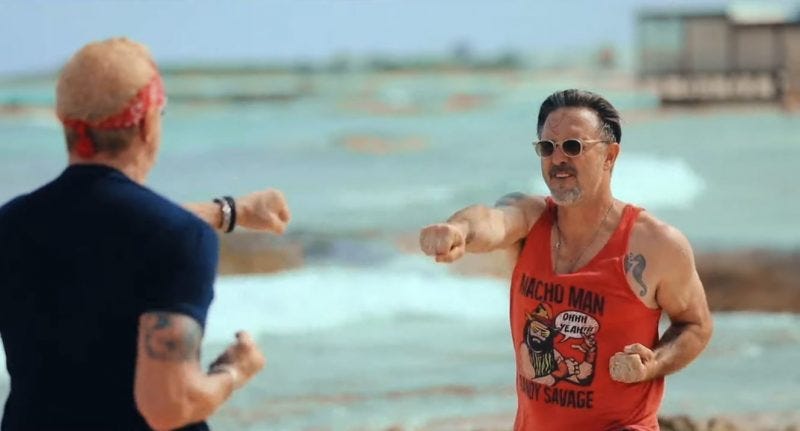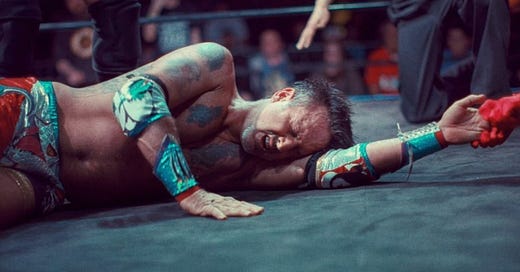You Cannot Kill David Arquette

Though it should certainly be the least of anyone's worries, when compared to all the other issues plaguing 2020, the global COVID-19 pandemic has created a strange period in which to be a film journalist. There are certainly no shortage of things to cover, as indie and video-on-demand releases have not slowed down in the slightest. But many higher-profile releases—the ones that get announced a year out and have a concrete release date for months, allowing for a sense of "hype" to build around them—have been pushed off indefinitely.
This has created a bit of a purgatory for nerds like me, and it was manifesting a bit of a fatigue on me—fatigue of writing, fatigue of watching, even fatigue of thinking about movies. I don't write for the page views or the likes, but it's noticeably less fun when the movies you write about don't garner the same level of interest and investment from your audience. I like writing about movies because it gives me a space to articulate my thoughts in great detail, but it's ultimately only one side to the arena I prefer even more: conversation. I like writing about movies because I like talking about them... with other people. It's hard for a review to drum up discussion when no one has seen or is interested in the film you're reviewing. But anyway, as a movie critic, movie lover, and movie anticipator, I was definitely developing some fatigue.
And then came You Cannot Kill David Arquette.
I've certainly seen exceptions, but generally, I don't experience the same visceral reaction or level of entertainment with documentaries that I do with narrative film. But every once in awhile, a group of people clever enough find a topic unique enough to document a story that is just as effectual as any scripted, dramatized rendition of the subject could hope to be, or more.
Such is the case with this new documentary from Super LTD, NEON's "boutique division." For those who don't know who David Arquette is, the film takes a moment early on the recap his career: Arquette was of the iconic mid-90s class of young male actors that included Matthew McConaughey, Leonard DiCaprio, and Will Smith. He'd starred in a number of big hits, guest-starred on TV shows, and did some respected indie dramas. He hit his biggest goldmine in 1996 with Wes Craven's Scream, though, as the documentary tells it, his casting as the dopey, ineffectual deputy sheriff Dewey Riley resulted in years of type-casting in stupid, low-brow roles. Snagging one of said roles in the 2000 pro wrestling comedy Ready to Rumble, Arquette decided to join World Championship Wrestling as a promotional stunt for the film.
Unfortunately for Arquette, it was decided by WCW heads that it'd be a cool idea of Arquette, the Hollywood hotshot newcomer and outsider would win the World Heavyweight Championship.
This was not received well by wrestling fans.
After that, as the doc tells it, Arquette slowly faded into obscurity. It would be inaccurate to say he hasn't had work for the last 20 years, as his IMDb lists 129 acting credits, most of them since 2000. But it goes without saying that Arquette is a far cry from the household name A-lister that he may have once been—honestly, without looking it up, I couldn't tell you the last high-profile project I saw him in.
Scorned by the wrestling community for spitting in the face of the sport, and dismissed by Hollywood and moviegoers as a serious actor, and plagued by severe anxiety and other mental health issues, Arquette turned toward his family and personal life, as well as drugs and alcohol. All the while, the shame of rejection as a result of forces beyond his control would eat at him, until David knew he had to do something to clear his name.
When we meet Arquette in the "present" (I believe the journey starts in about 2017), things are relatively stable. He may not be sober, and his anxiety is at an all-time high, but he has a loving and stable family in the form of three children and his wife Christina McLarty. But perhaps it was this stability, along with the anxiety and drugs, that stoked a flame in David's heart. It was time to re-enter the world of professional wrestling. His journey takes him to sketchy backyard matches, run-down gyms, Mexican lucha, and even a brush with "street wrestling."

Directors David Darg and Price James capture Arquette's near-mythic quest for redemption in an almost surrealist fashion. Certain scenes and conversations will take place in absurdly picturesque settings and follow the beats of dramatic films. There's a scene where Arquette confronts his old WCW partner on a rocky beach to earn his blessing that feels straight out of a samurai or Star Wars film. Before he embarks on his journey, Arquette is captured riding a horse on a hilltop before the sunset, his bedazzled wrestling cape billowing behind him. The film even begins with wrestler Ken Anderson, our villain, slamming weights in a dark, mood-lit gym, screaming his disdain for the hero.
Normally, I tend to balk at scenes in documentaries that feel too "set-up." When a scene feels too structured or rehearsed, it's usually easy to detect, and it deflates that moment of any authenticity. That doesn't seem to be quite what's going on here; all of Arquette's conversations and interactions with people are real. Darg, James, and their editing crew fill in the gaps between these authentic moments with dramatic beats to move the story from one point to the next. But Arquette actually wrestles. He actually gets the tar beaten out of him. He actually argues with his protective wife about his safety and pisses off fans with his perceived "Hollywood ego." These moments are simply bookended with storytelling flourishes like symbolic match cuts and dramatic cinematography. The presentation is amplified, but the emotional core is authentic. It's kinda fake, but not really.
On that matter, "Wrestling's not fake," is a recurring mantra throughout the film, most notably coming from Arquette's mouth after taking fluorescent light tubes and metal folding chairs to the back. It's clear that Arquette, Darg, and James love professional wrestling. There's no smugness or cynicism about it here. Arquette is pained by the effect he had on that culture, and wants to make it right, for himself as well as for the fans and the sport. His journey feels weighty because the filmmakers ensure you understand how vital this is to him. There's nothing else Arquette could do right now but double down and learn how to be a wrestler, from the bottom rung up.
Sure, the outcomes of pro wrestling might be rigged, as they were when Arquette was given the WCW Heavyweight title in 2000. But for the vast majority of those who enter that arena, blood must still be shed before the match is finished. Blows must still be dealt and taken. You Cannot Kill makes it abundantly clear that, more so even than the high-profile wrestlers, backyard and semi-pro wrestlers have to learn how to take a beating, and how to destroy their bodies for the craft.
It's kinda fake, but not really.
It helps You Cannot Kill's emotional effect that Arquette comes off as such an earnest guy. He may not always say the right thing, but he's trying his best to do right by people. And that is made clearer by the people around him than even by Arquette himself. You Cannot Kill is chock-full of people around David being moved by his authenticity, extending gestures of love and compassion, and rooting for his redemption. Whether it be a luchador mask bequeathed to him by one of his trainers in Mexico, or an incredible gesture of support and showmanship from his wife before the final fight of the film, Darg and James consistently find ways to not only pull at your heartstrings but drive home the point that Arquette's journey is one worth taking, for him, for those he meets along the way, and for the viewer.
All of this emotional realness, combined with Darg's and James' dramatic cinematography and Paul Rogers' sharp editing, create a wonderfully surreal, heightened reality around Arquette's absolutely authentic journey; it's subjective documentary at its best, simultaneously capturing the very spirit of professional wrestling. I've never been a big fan of the sport myself, but I would imagine it difficult to come out of You Cannot Kill David Arquette without a deep appreciation for the art of wrestling, and for David Arquette's commitment to doing right by it.
https://www.youtube.com/watch?v=K5Ujq07y8Rk&w=585



